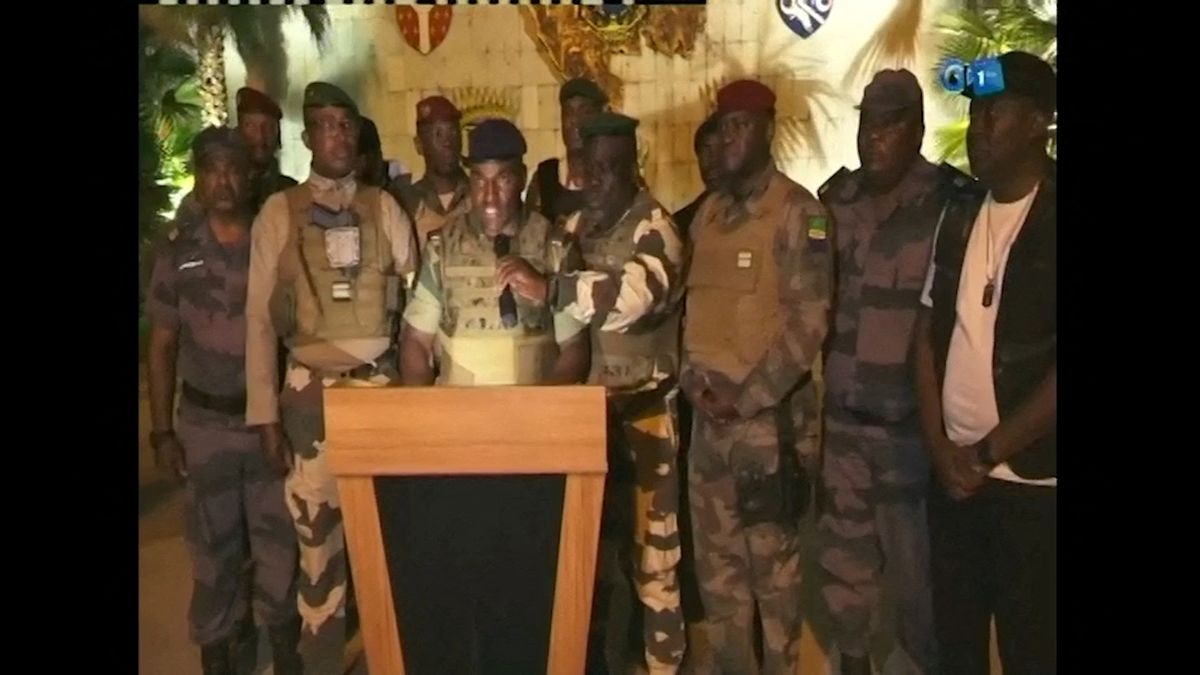Military coup seizes power from president in Gabon
A group of Gabon’s senior military officers announced on Wednesday that they had seized power.

A few minutes every morning is all you need.
Stay up to date on the world's Headlines and Human Stories. It's fun, it's factual, it's fluff-free.
The backstory: The central African country of Gabon (known for producing oil) is a former French colony, but it became independent in 1960. Since then, it’s been a republic. Gabon’s first president, Gabriel Léon M'ba, held the position from 1960 until 1967. Then, in 1967, Omar Bongo became president and established single-party rule.
After the constitution was amended in the 90s, a multiparty system was adopted. But, elections in the country have been criticized for being pretty shady and lacking transparency, and Bongo kept getting re-elected to the presidency until his death in 2009. Then, his son, Ali Ben Bongo, was elected to the presidency. This extended the Bongo family’s political dynasty. This new Bongo has served two full terms as president. There was an attempted coup in 2019, but it was snuffed out pretty quickly.
The Bongo government has been criticized for not sharing the wealth of the country with its citizens, with about a third of the population below the poverty line and recent counts of unemployment for young workers clocking in at around 40%.
More recently: Bongo ran for a third term in the most recent Gabon presidential election last weekend. His main opponent was Albert Ondo Ossa, an economics professor and former education minister who had plans to dissolve the national assembly, redraw the electoral map and organize new legislative elections to create a government that would address economic inequality.
On Wednesday, the Gabonese Election Centre (CGE) said that Bongo had won the election by a landslide with 64.27% of the vote. Ossa reportedly took home 30.77% of the vote. But the opposition party is saying those results are phony. Gabon’s election didn’t have much international oversight, and some foreign broadcasts were even suspended. Gabonese authorities also cut internet service and enacted a national curfew after polls closed. These moves have raised some eyebrows. With calls of something fishy going on, concerns about possible unrest were already brewing as soon as these results were called.
The development: A group of Gabon’s senior military officers announced on Wednesday that they had seized power. They said the results of the election were canceled, putting Bongo under house arrest in the capital of Libreville. They also said they’d arrested the president's son, Noureddin Bongo Valentin, and others for corruption and treason. When this announcement was made, hundreds of people flooded the city streets to celebrate the coup.
The coup leaders declared themselves The Committee for Transition and Restoration of Institutions and held a vote to determine the leader of the governmental transition. General Brice Oligui Nguema, leader of the presidential guard and Bongo’s cousin, was appointed unanimously. Meanwhile, the UN, the African Union and France have all condemned the coup.
Key comments:
“Our beautiful country, Gabon, has always been a haven of peace. Today, the country is going through a serious institutional, political, economic and social crisis,” said the coup leaders on TV. “We are therefore forced to admit that the organization of the general elections of 26 August 2023 did not meet the conditions for a transparent, credible and inclusive ballot so much hoped for by the people of Gabon.
"In the name of the Gabonese people ... we've decided to defend the peace by putting an end to the current regime," a spokesperson for the coup leaders said on TV on Wednesday.
"We condemn the military coup and recall our commitment to free and transparent elections," said French government spokesman Olivier Veran.
“Political analysts believe that it’s a trend that’s emerging in Africa… [and] unless leaders in Africa sit up and listen to the people, certainly we will have an epidemic on our hands,” Al Jazeera’s Ahmed Idris said, reporting from Niamey in Niger.
“The coup in Gabon is different from what we are seeing in other West African countries. While those other coups are more about security and governance, this is specifically about the electoral process,” Ovigwe Eguegu, an analyst at the security consultancy group Afripolitika, told Al Jazeera.




Comments ()